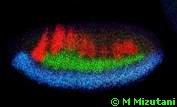Tuesday, September 12, 2006
Mechanism to Organize Nervous System Conserved in Evolution

A study led by University of California, San Diego biologists suggests that, contrary to the prevailing view, the process in early development that partitions the nervous system in fruit flies and vertebrates, like humans, evolved from a common ancestor.
In the September 12 issue of the journal Public Library of Science Biology (PLoS), the researchers report that in both fruit fly and chick embryos proteins called BMPs play similar roles in telling cells in the early embryo to switch certain genes on and off, specifying the identity of the cells making up the three primary subdivisions of the central nervous system. The findings suggest a unified model of early neural development in which at least part of the mechanism for creating neural patterning has been preserved from a shared ancestral organism that lived over 500 million years ago.
"We have provided the first evidence for a common role of BMPs in establishing the pattern of gene expression along the dorsal-ventral axis of the nervous system of vertebrates and invertebrates," said Ethan Bier, a professor of biology at UCSD and senior author on the study. "Our results suggest that this process has been conserved from a common ancestor rather than evolving separately as had been previously believed." [News, CNS, Drosophila melanogaster, BMP]
--
Based on the open access PLoS Biology paper "Threshold-Dependent BMP-Mediated Repression: A Model for a Conserved Mechanism That Patterns the Neuroectoderm".
technorati tags: study, university, california, san+diego, process, early, development, nervous+system, fruit, flies, vertebrates, humans, evolved, common+ancestor, ancestor, public, library, science, biology, plos, fly, chick, embryos, proteins, bmps, cells, embryo, genes, identity, primary, central, cns, model, neural, development, mechanism, neural, ancestral, organism, pattern, dorsal, ventral, invertebrates, bier, uscd, bmp, news, drosophila, melanogaster, open+access
Add to: CiteUlike | Connotea | Del.icio.us | Digg | Furl | Newsvine | Reddit | Yahoo